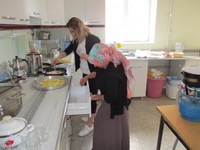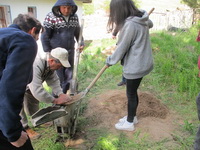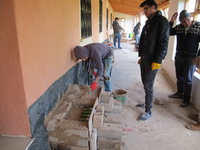THE 2018 PROGRAMME
ACTIVITIES
The 2018 Activities
In 2018, hands-on activities at the Kerkenes Eco-Center took place in April when a
group of METU students registered for a Hands-on Building course by Prof. Dr. Soofia Elias
Özkan, Dr. Berrin Çakmakli and retired Instructor Françoise Summers. The METU students
participating in Hands-on sessions for the Architecture in situ course, Arch 326 were hosted
for a 3 day program that included visits to the nearby archaeological site, the Iron Age
ancient city on the Kerkenes Dag. Project assistants Said Kibarov, Ilya Hayrutdinov and Irfan
Gökçe Özer helped with organizing the hands-on activities as well as the repair and
maintenance of the amenities. Facilities include the village school now rehabilitated and
called the Sahmuratli Visitors and Training Center. Women from the village prepared the
meals (Figs 7 and 8).
Before their trip to Kerkenes, METU students enrolled in the Arch 326 course were
given an introduction on the Eco-Center's past activities, its status, mission and also the
ongoing archaeological research in the ancient city on the Kerkenes Dagi which they visited
(Figs 9 and 10). At the Kerkenes Eco-Center they visited the experimental buildings including
the Strawbale Greenhouse, The Kerkenes Strawbale House and The Solar House (Fig. 11). The
importance of using appropriate building material and design to improve the environmental
performance of buildings was highlighted. As part of the Hands-on program, the students
spent time working with local building materials and experimenting with design alternatives.
Hands-on Activities
During the hands-on sessions, held at the Sahmuratli Visitors and Training Center,
educational activities focused on energy efficiency and environmental design. Students
learned how to make traditional mudbricks with a wooden frame (Figs 12 and 13). The brick
press was also used to experiment with different ratios of mud and straw to demonstrate
their different properties (Figs 14, 15 and 16).
Villagers taught the students how to prepare and apply mud plaster in the traditional
way. Matthieu Pedergnana, a doctoral student and adviser to the project, gave advice on
how to mix mud with different substances such as egg and oil so as to improve their
durability and resistance to rain and snow (Fig.17). The mud plaster prepared following his
recommendations was used to plaster the Nubian vault (Fig. 18). Time will tell us if this new
plastering will be more weatherproof.
Repair and Maintenance of Solar Cookers
During the hands-on sessions students have helped with some repair and maintenance
tasks at the Kerkenes Eco-Center. Features built by previous groups in the garden needed
repair and maintenance (Fig. 19). New silvery adhesive foil was used to reline the parabolic
disc of the solar cookers as the original foil had lost its reflectiveness (Fig. 20).
Design and Build Projects
Assignments were given to students and in small groups they selected a relevant topic
to study. Each group then used the given time to design and build a chosen item that would
be a useful addition to the Eco-Center. One group chose to design a small oven in the garden
(Figs 21 and 22). Another group built a bench by the kitchen door thus providing a place to
sit in a sunny area when spring temperatures are still low (Figs 23 and 24). A third group built
a planting box where herbs could be grown within the end room of the solar space (Fig. 25).
Visit from AGU Students in October 2018
On their way from Kayseri to the Kerkenes Eco-Center, the group from Abdullah Gül
University stopped at the Votorantim Cement Factory in Yozgat. A presentation on the
manufacturing process was given before lunch and the visit of the factory and laboratories
were scheduled for after (Figs 26 and 27). It was a pleasure to meet our sponsors before
heading to the Kerkenes Eco-Center for the rest of the day's activities (Fig. 28).
Once arrived at the Sahmuratli Visitors and Training Center, the students were briefed
on the afternoon's hands-on activities (Fig. 29). A demonstration on traditional mud brick
production was given by two villagers (Fig. 30). Students were given the opportunity to make
some bricks using the wooden frame to produce four bricks at a time (Fig. 31). Finally two
small ovens were built using mudbricks that had been made previously (Fig. 32).



